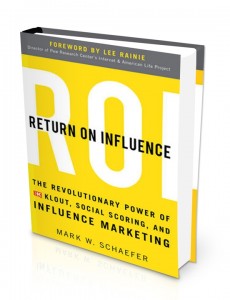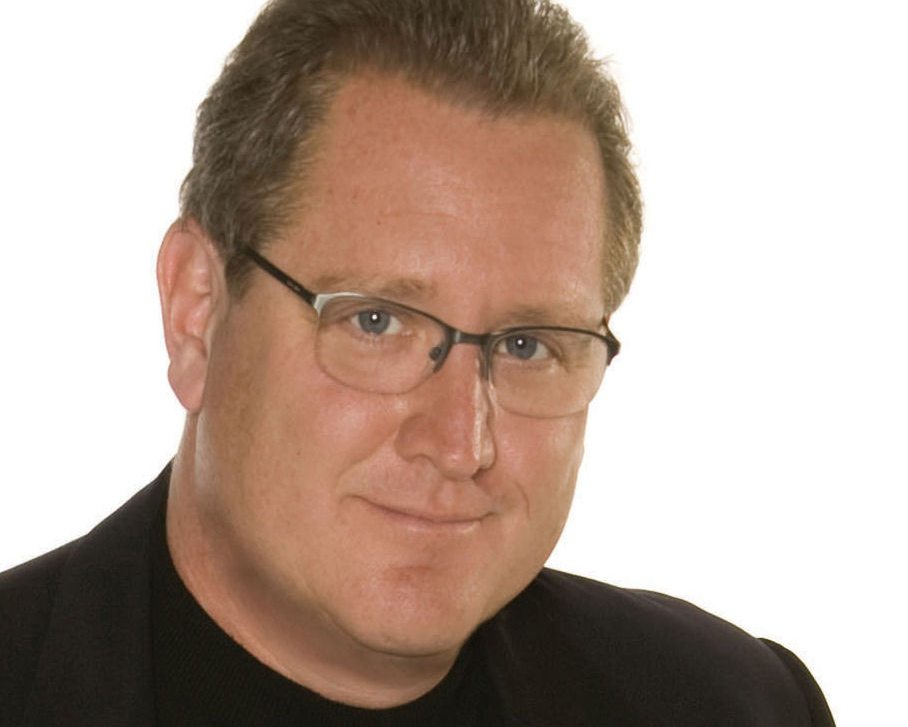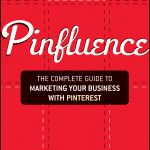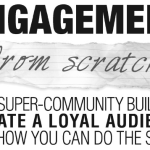 Mark Schaefer stopped in at the Word Café last week and we had a chance to talk recently about his new book, Return on Influence.
Mark Schaefer stopped in at the Word Café last week and we had a chance to talk recently about his new book, Return on Influence.
Here are the highlights:
Q: How did you decide to write this book? I have to be honest…I’ve been watching this whole Klout thing from the sidelines and haven’t really been that enamored with it. But your book really gave me pause. It’s one of the most thought-provoking marketing books I’ve read in awhile.
A: Your reaction to Klout is pretty typical. I got interested in it about a year and a half ago when I wrote a blog post about Klout and one gut commented: “Mark, I hope you’ll join me in stopping this. It’s un-American!” It was almost like a political statement, rather than a business-like statement. I saw this emotionally visceral reaction happening and at the same time started to pick up on stories of companies using these scores in their traditional marketing programs. And we’re talking about companies like Audi, Disney, Virgin Airlines — the kind of names that really get your attention. I wanted to figure out what was missing. So many people say, “this Klout thing is a bunch of hooey. It’s a meaningless number.” And yet, some very bright marketing people at these big companies are using it. What’s going on? What’s the truth? That’s what got me started. The proposal I sent into McGraw-Hill was quite unusual because I said, “Here’s my outline. But to tell you the truth, I don’t know how this book is going to come out. It’s an investigation. There are no experts. This is all new. It couldn’t have happened two years ago.” They trusted me and went with it. And what I hope is that people will have a reaction similar to yours. That when they get through the book, they’ll say “Oh. I’m starting to get it now.” And whether folks agree with it or not, I’m hoping they can at least cut through the emotion and see what’s really going on here. To better understand the trend. And the opportunity.
Q: It’s funny, because I went and checked my Klout score this morning for the heck of it — you know, to prepare for our discussion — and I’ve fallen back down to a 50 from a 54.
A: You’re still in the 95th percentile, so that’s pretty good.
Q: Which cracks me up because I don’t even try. And the funniest thing I found is that Klout has identified me for as an influencer on a topic called, ‘Chicago Bears.’ I don’t live in Chicago. And I never talk about sports. The only thing I can think of for how they got that connection is a blog post I wrote called “How to Keep Bears from Eating Your Business.” It was a highly shared post. But absolutely no mention of Chicago in there at all. And that’s one of the things that makes me seriously scratch my head about Klout.
A: The difficulty is that Klout is iterating in public. And let’s face it, all these social media companies are keeping scores on you. Google’s doing it. Facebook’s doing it. Yahoo, Microsoft. Every place that you’re participating in a forum or you have a credit card. They’re collecting data and creating highly complex profiles of you. Giving you scores. The only difference is you don’t know what your score is on those sites. You don’t know if it’s right, wrong, high, low or what affects it. Klout’s coming along and they’re the only one’s admitting, “Hey, we’re doing this. And we’re going to try our best. And you can come along with the journey and watch our progress.” It’s a little bit like making sausage. It’s kind of ugly. Hopefully at the end of the day, it will be a masterpiece. They’ve got a long way to go. And this idea of being accurate about what you’re influential about is absolutely key. It’s also insanely complex to do in a mathematical form. But they’ve got to get that right. And, to their credit, they have made some innovations and some improvements over the last 3-4 months. I think a lot of people are in your camp, where they’re seeing that Klout is telling them they’re influential in weird silly topic areas (like the Chicago Bears, or in my case, Sesame Street). But if you look past that and you recognize they’re in the silent movie stage and dealing with an incredible amount of complexity, you might cut them a little slack. It’s going to get better and better and better.
Q: You’re absolutely right. Especially those of us who need to make a living as marketers in any way, shape or form. Just like the gentleman you talked about in the book who went for the job interview and they turned him down because his Klout score sucked.
A: It’s going mainstream very quickly. I’m hearing stories like that every day. It’s just like our credit scores. Those aren’t perfect either. But it is an indicator of something. And it is an indicator that businesses pay attention to if they need a short hand way of making a decision. Let’s say you’ve got two very capable candidates who are matched equally for an entry-level PR job. One has a Klout score of 55 and the other has a score of 15. Why wouldn’t you take the person that has a 55, if they’re equally qualified? I’m not saying you should base your whole decision on that. That would be silly. The one thing that Klout does increasingly well, is measure how good we are at moving content. How well we can create content that gets shared and reacted to on the internet. That’s all they do. It’s not going to measure your influence with your spouse. Or at your job. And it never will. But for so many jobs, the importance of having an effective social media presence is becoming important. So why not look at this as one indicator — just one — of someone’s capabilities? I see it moving that way.
Q: It used to be just a few years ago that employers would Google you and check out your social media profiles to see what kinds of things you share and what people are saying about you. This is the same thing, it’s just a short cut.
A: One of the things I talk about in the book, the first part of the book explores what’s different now. Influence online and offline. And the one I think that was most stunning and disheartening to me, is this idea that something like a Klout score or the number of Twitter followers you have, may be more important than your accomplishments to some people. Because of the information density on the web, people aren’t digging as deeply as they used to. They’re not trying to find out what a person has actually accomplished. They’re not asking, “What has this person actually done?” Unfortunately, people do take shortcuts. They look at how many Twitter followers you have, what your Klout score is and from there, they’ll decide that you know what you’re talking about. When there’s a real possibility that you could be a complete fake.
Q: You did give us some great advice (in the book), and I’m wondering if you might share one or two of your favorite tips on how to address your level of influence and how people view you.
A: I learned — this was a learning process for me completely — I interviewed more than 70 people for the book and read a lot of academic research to figure out what the science is behind influence online. Is there really something there? Here’s what stood out for me. I base a lot of the book on an influence model developed by Dr. Robert Cialdini who is an incredible intellect and well-known lecturer and writer. And I asked him, “In this information-dense world, how do we cut through the clutter? How do we stand out and get people to notice? What is really the heart of influence today?” And he said, “To be more human.” And I thought that was profound. Because in the face of all these badges of social proof, he says that being more human and revealing more of yourself — being authentic and kind — can help you stand out. I thought that was very interesting. And certainly, I’ve found that to be true.
Another thing I hope people take from the book is some inspiration. I hope they find it uplifting and empowering. Because yes, it talks about power and influence and Klout scores, but it also talks about this idea that we’re in the era of the Citizen Influencer. Which is just so exciting. It doesn’t matter who you are, where you live, what you look like, what your skin color is, or how much money you have. Everybody can publish and have influence. This could never have happened in the history of mankind. You don’t have to have a degree from Harvard. You don’t have to have ANY degree. Some of the most powerful people I profile in the book, never graduated from college. They found their voice. They found a way to connect to people through blogging, Twitter, Facebook and some of these other free publishing tools. For me, that’s so exciting. It’s thrilling to be alive at this time to see all of this happening.
Q: Yes, I did think it was a very uplifting book. Sometimes things of this nature can feel a little negative. But you did a great job of keeping us pointed in the right direction. Now, let’s talk about stories. Since we want to be more human, can you share one of the stories that you found most inspirational, or that maybe changed something for you?
A: There were so many, but you know — I think I’d like to share one that’s not in the book.
Q: Oh! We get an exclusive!
A: I’m actually starting to use this story in one of my speeches. Again to keep people centered on the idea that there’s a certain ickiness associated with people giving you a score. People assigning you a number. But there’s also a certain opportunity, there’s a certain freedom now that comes with this power — that all of us have. The story that I love is about this young lady named Molly Catchpole. She’s 22 years old and recently graduated from college. And like so many Americans today, she found that once she got out of school, she couldn’t find a job. And soon, she was facing a crisis because she had to start paying back her college loans. She was trying to scrape together money any way she could. She was working as a part-time nanny. And then one day she got a letter in the mail from Bank of America. And it said, “Molly, if you don’t keep an average daily balance of $20,000 in your account, we’re going to assess a $5 monthly fee just for you to be able to access your money.” At that point, she had had enough. And she said, “This is unfair!” So she started to tweet about it and blog about it and rant about it online. And soon, she had a movement of support around her. Then, she learned about this site called Change.org where you could create a petition. Within two weeks, she had 300,000 signatures on this petition. And within three weeks, BofA stopped assessing the fee. When could this have ever happened before? She’s a 22-year-old, unemployed, part-time nanny who’s struggling and suffering and yet, could stop one of the biggest banks in the world in its tracks. She is a Citizen Influencer. This is exactly what I talk about in the book. This is our time to be heard. To be able to have influence and power. Ten years ago, for something like that to happen, it would’ve had to have started with a politician or maybe a movie star. They would’ve exerted their influence to get on television to talk about this unfair situation. This young lady didn’t need any of that. She did it on her own. It’s very energizing and inspiring to me.
Q: That’s a great example, Mark. We hear so many stories about what the big guys can accomplish. What Southwest Airlines did. Or what Coke did. They’ve got massive marketing budgets behind them. We don’t.
A: Isn’t that part of the irony, that these big companies and brands can have all this money? And now, they’re coming after us? One of the examples from the book talks about when Audi introduced a new car into the U.S. They didn’t call George Clooney or Derek Jeter, they called this friend of mine, Calvin Lee (@mayhemstudios) who’s a web developer for the City of Los Angeles. He’s got a Klout score over 80 and when he tweets or comments or blogs, people listen. He’s a great example of the new Citizen Influencer that these companies are trying to connect to because they can create buzz.
Q: How did Calvin get started on this path? I found it really interesting that somebody that worked for the City would have this huge social media following. What made him to decide to get on Twitter in the first place?
A: He’s very shy. And this is one of the things that’s always been interesting to me. You would think that the people who are most successful on the social web, are gregarious and outgoing. But he’s painfully shy. He’s a humble man. When I interviewed him for the book, I could barely get two sentences out of him. But what he said was, “This is the way I can connect with people. In my way. On my terms. I don’t have to be the life of the party. I can just communicate 140 characters at a time.” He was never really popular in school. He had a difficult time finding his thing. And yet, communicating on the social web became a great equalizer for him. He’s really a good example of what it takes. I talk about the three things that you need to do to have an effective social media presence. And if you do those three things, the influence will take care of itself. And Calvin does those three things very well.
First, the academic research shows that people generally don’t share your content on social media. Only a very small percentage of people take action. So you need to surround yourself with people who are interested in you. You need to find like-minded people. Not connect randomly. You need to find your audience — a group of people with some propensity to be interested in you and what you do. Second, you need to share content that’s interesting. That’s relevant, timely and perhaps entertaining. And Calvin certainly does that. He shares what’s going on in his life. His adventures. Third, you need to engage with people. You can’t be a stalker. You have to be authentically helpful. And I think that’s really the key to Calvin’s success. He’s a lovable guy. He described his twitter audience as almost like his customers. He wants to try to find ways to help people and support them in any way that he can. Just the other day, I saw one of his tweets and he said A friend of mine has a relative who broke their neck and they need help. They’re trying to get this special van so they can get around. And he’s always looking for ways to help people. If you do those three things, don’t worry about it. Your Klout score will be fine.
Children who have suffered trauma need hugs, help & hope. Help now by donating a tweet. JustCoz.org/operationSAFE#DT @operationSAFE — Calvin Lee (@mayhemstudios) April 28, 2012
Another example: I met this young lady online; I saw that she was looking for a job. She had been following me on Twitter and on my blog. And I said, “Is there anything I can do to help you find a job?” What I didn’t realize is that she’s deaf. How would I know? We’re communicating on the web like anyone else. The social web is a great equalizer. She told me, “A lot of people who can hear might have the radio or the television on as their background noise. Social media is my background noise.” It’s opened up so many opportunities for all of us. It’s empowering and allows us to connect with lots of exciting people, ideas and opportunities.
If you want to read more about Mark’s book, go to ReturnOnInfluence.com. It’s available just about anywhere you can buy a book (Amazon, Barnes and Noble, etc). It’s even getting translated into several languages. Check out his blog: BusinessesGrow.com where he talks about marketing and social media influence topics. And find him on twitter @MarkWSchaefer.










